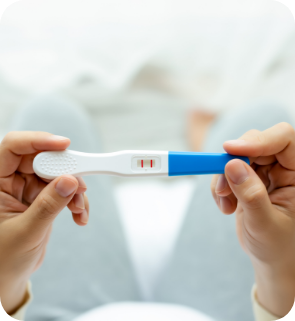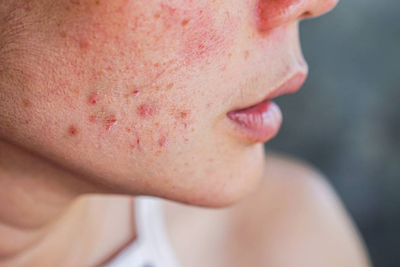
Which Type of PCOS Do You Have?
UNDERSTANDING THE 4 TYPES OF PCOS, AND HOW TO IDENTIFY YOURS
And it gets even more confusing when you see that there are individual types or variations of PCOS. Spend any amount of time speaking with women and you quickly see that they do not all experience the same symptoms as one another.
For example, one woman may find that her PCOS is driving her to gain weight, she barely sleeps a wink at night and suffers from excessive hair growth on her face. Another woman may have a lean body weight but, she suffers from acne and goes months at a time without having her period.
Every woman with PCOS will experience PCOS differently.
It is important to note that these PCOS types are not 100% recognised in scientific literature. You’re never going to have your doctor tell you that you have XYZ type of PCOS. They will simply diagnose you with the umbrella term of PCOS.
Researchers and doctors all agree that there are many drivers that result in the symptoms that a woman with PCOS may experience. But, what is not known is why certain women with PCOS present differently than others.
Let’s have a look at the four types of PCOS to help you figure out which one you most likely have.
TYPES OF PCOS:
1) INSULIN RESISTANT PCOS
Insulin resistant (IR) PCOS is by far the most common type of PCOS, affecting up to 70% of all women with PCOS. These women will generally be overweight, suffer from symptoms of excess androgens such as acne, male-like hair growth, male-like hair loss, and have irregular periods.
Presentation:
👉 Most likely overweight
👉 Suffer from acne, hair growth and/or hair loss, irregular periods
👉 Mood and sleep issues
The connection between PCOS and insulin resistance is so strong that certain experts have suggested that ALL women with PCOS be treated for insulin resistance - a condition that occurs when the cells of your body become resistant to the normal effects of insulin, a blood sugar regulating hormone.
Basically, your cells don't recognize that insulin is there, causing insulin levels to rise (hyperinsulinemia) and as insulin levels get higher and higher over a sustained period of time they start to drive the symptoms of your PCOS.
Among these problems include imbalances of your sex hormones, including relative high estrogen, low progesterone, and high testosterone levels.
Because of this, most of the treatments are directed at reducing insulin levels and improving blood sugar levels. This is why medications such as metformin are often prescribed to women with PCOS. Metformin is a diabetic medication known as an insulin-sensitizing drug that helps reverse insulin resistance.
Testing and results for insulin resistant PCOS:
💉 Free and total testosterone (typically elevated free OR total testosterone)
💉 Fasting blood glucose (elevated fasting glucose)
💉 Hgb A1c (which stands for hemoglobin A1c) (elevated Hgb A1c, typically higher than 5.7%)
💉 Fasting insulin (elevated fasting insulin)
Your doctor may also test for your DHEA levels, which is an adrenal hormone. Levels of DHEA will most likely be normal in IR PCOS.
Best ways to control insulin resistant PCOS:
✅ Follow a low to moderate carbohydrate diet and ensure the majority of the carbohydrates you eat are low-gi
✅ Exercise between 3-6 days per week with a combination of resistance, HIIT, and restorative workouts
✅ Ensure you are getting at least 7 hours of sleep each night
✅ Supplement with inositol, NAC, and apple cider vinegar
2) INFLAMMATORY PCOS
Inflammatory PCOS is when your PCOS is being driven by chronic inflammation. Short bouts of inflammation can be life saving. For example, wound healing is a form of inflammation and protects your body from infection - this inflammation is wonderful.
The inflammation in regards to inflammatory PCOS is long-term, chronic inflammation, causing your body to be on ‘high alert’ 24/7. Several studies have now found that this type of PCOS can cause elevated levels of CRP, an inflammatory marker compared to those without the condition. Elevated levels of CRP are also associated with diabetes, insulin resistance, and heart disease―conditions which are more common in those with PCOS.
Presentation:
👉 Fatigue and unexplained tiredness
👉 Digestive issues and food sensitivities
👉 Recurring infections, skin issues, headaches, and joint pains
The trigger for inflammatory PCOS is not truly known but, it’s most likely from a combination of genetic potential, stress, environmental toxins, or inflammatory foods.
Testing and results for inflammatory PCOS:
💉 CRP (C-reactive protein) (elevated)
💉 ESR (erythrocyte sedimentation rate)
💉 Possible elevated DHEA
💉 Vitamin D deficiency
Best ways to control inflammatory PCOS:
✅ Follow a anti-inflammatory diet and reduce gluten intake
✅ Reduce exposure to environmental toxins like plastics and pesticides.
✅ Supplement with vitamin D, zinc, magnesium and probiotics.
3) ADRENAL PCOS
Women with adrenal PCOS will have many of the same symptoms as women with IR PCOS but their lab tests will be different. The main difference will be these women typically do NOT have elevated free and total testosterone.
Instead, women with adrenal PCOS will have elevated levels of DHEA which is another androgen hormone predominantly produced by the adrenal gland. The main trigger for this is thought to be stress-related, either emotional stress, metabolic or physical stress.
Presentation:
👉 Most likely overweight but, can be of normal weight
👉 Suffer from acne, hair growth and/or hair loss, irregular periods
👉 Issues arising from stress such as fatigue, mood issues, and sleep issues
If you believe you may have adrenal PCOS, you want to have your prolactin levels check to rule out another condition that presents similarly to PCOS called non-classic congenital adrenal hyperplasia (NCAH) so make sure you don’t skip that.
Testing and results for adrenal PCOS:
💉 Free and total testosterone (normal range for both)
💉 Serum DHEA (elevated serum DHEA levels)
💉 8 am serum cortisol (High or normal serum cortisol)
💉 Insulin resistance (normal insulin and blood sugar)
Best ways to control adrenal PCOS:
✅ Reduce intake of sugar and processed foods
✅ Reduce stress levels & practise stress reduction on a daily basis.
✅ Really focus on getting quality sleep each night
✅ Supplement with ashwagandha, l-tyrosine, curcumin, magnesium, and vitamin D
4) POST-PILL PCOS
This is the type of PCOS that is not really recognised by conventional medical experts but, coming off of birth control does appear to cause a temporary PCOS-like state in some women. This doesn't mean that all women will get this condition if they come off of birth control but it does mean you should be aware of it if you are considering using birth control.
In order for your PCOS to be caused or related to birth control, you must have had normal periods before you started the pill.
Presentation:
👉 Did not suffer any PCOS like symptoms before starting birth control
👉 Suffering from PCOS like symptoms since coming off birth control
Women in this position should be very careful to avoid a premature diagnosis of PCOS without first looking at their LH and FSH levels as the pill can actually cause suppression of your FSH and LH levels and lead to hypothalamic amenorrhea after you discontinue taking it for an amount of time.
Women who have post-pill PCOS after stopping the pill generally have abnormally elevated LH levels which would differentiate this condition from hypothalamic amenorrhea.
Best ways to control post-pill PCOS:
✅ Follow a healthy lifestyle for a few months and your body should regulate on it’s on as post-pill PCOS should only be a temporary state until your hormones get back to normal after being suppressed while on the pill.

















Leave a comment